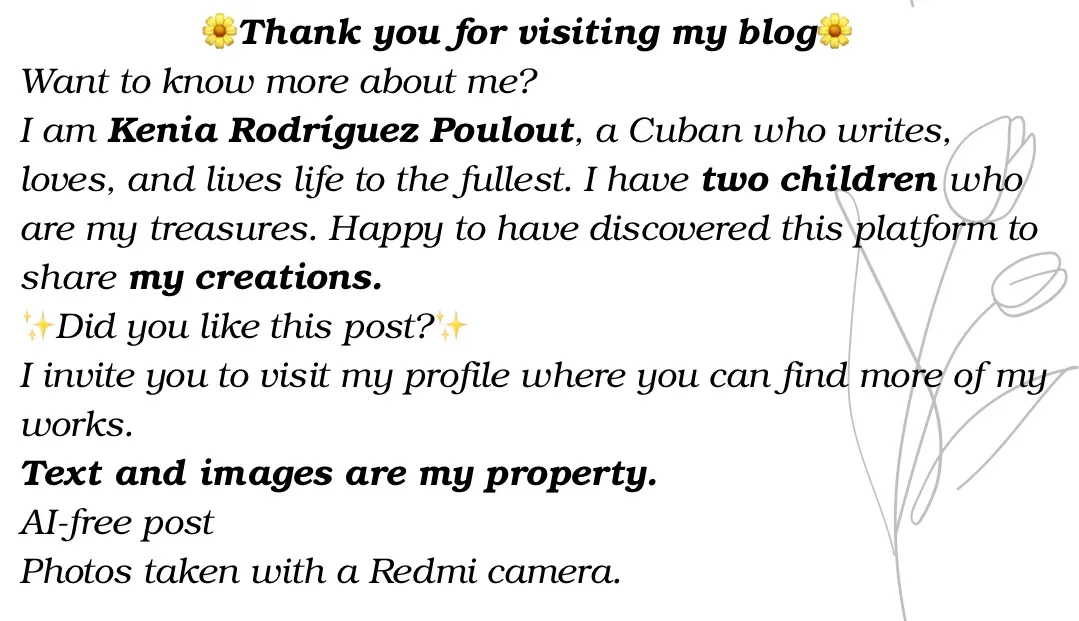Hola, mis amigos. Un saludo afectuoso para todos, especialmente a la familia de #holoslotus. Hoy regreso para compartir con ustedes mis reflexiones.

La comunicación humana es uno de los primeros logros que tuvo el hombre desde el principio de los tiempos. Tan importante como otras necesidades básicas del organismo. Saber escuchar y a la vez ser escuchados, es la base fundamental de una comunicación exitosa y fluida.
Personalmente me considero una buena escuchadora, me gusta dejar que las personas se expresen sin interrumpirlas, saber como piensan y luego exponer mis criterios. Esta característica de mi personalidad parece ser algo que muchas personas infieren, incluso, sin conocerme. En más de una, dos y hasta tres ocasiones, se me han acercado personas a contarme sus problemas, situaciones y secretos sin el más mínimo temor y si con mucho desenfadado.
Quizás mi mirada les trasmite seguridad y confianza. Quizás fui Cura de alguna parroquia imaginaria en otra vida y ven en mí a alguien con quien confesarse. Esto, que tal vez pudiera ser un don, es también una gran responsabilidad y hasta ahora he sabido llevarla de forma digna.
Sin embargo, nos encontramos con frecuencia personas que padecen de una "sordera convencional", para quienes la habilidad de escuchar a los demás es limitada. Son aquellos que, aunque físicamente presentes, viven en una burbuja de autocomplacencia donde las palabras ajenas resbalan como el kimbombó, caen en el vacio, en la nada. Son las personas que no saben escuchar.

Es muy fácil detectar a los malos oyentes, ellos solitos se delatan por una serie de rasgos inconfundibles. Su conversación es un monólogo disfrazado, apenas terminas una frase, ya están lanzándose a su propia anécdota, relacionada o no con el tema, pero siempre centrada en sí mismos.
Apenas dejan a los demás decir tres palabras, tienen la mala costumbre de interrumpir, con urgencia, las ideas de otros para expresar las suyas, como si temieran olvidar su propio pensamiento. Este tipo de sujeto aprovecha la más mínimas pausas del otro como huecos para colarse. Su mirada se nubla, se desvía hacia el teléfono, o adquiere ese vidrioso aspecto que los hace expertos en cambiar temas o divagar.
Para engañar, utilizan una falsa escucha que consiste en asentir de forma mecánica con la cabeza y con monosílabos vanales (sí, sí, claro, ajá, por supuesto, cómo no, ciertos), pero sus preguntas o afirmaciones revelan que no captaron el mensaje, o peor aún, lo distorsionan para ajustarlo a sus intereses.

Sus palabras favoritas son el "sí, pero..., que no es una continuación del diálogo, sino un desvío hacia su propio camino. Son manipuladores e incapaces de manifestar empatía con ideas o propuestas ajenas. Estos especímenes son egocentricos y pretenden que todos giren a su alrededor como satélites. En el caso de personas estudiadas, su arrogancia intelectual asume que lo que el otro dice carece de suficiente valor como para merecer atención.
Cuando no escuchamos a los demás, esto puede generar en ellos frustración, impotencia y sensación de invisibilidad. Puede, además, ser causa de baja autoestima. Cosas como estas suelen suceder en algunos matrimonios y relaciones sentimentales. Anular a tu pareja, no dejarla expresarse puede eliminar la confianza, y cuando no hay confianza, el vínculo deja de ser.

Si eres del equipo de los "no escuchadores", te cuento que siempre se está a tiempo para salvarse, solo tienes que tomar un poco conciencia, humildad y descubrir que el mundo no gira en torno a tí, que cada persona tiene una historia única que contar. Historias de la que se puede aprender mucho.
Incluso, no solo en conversaciones personales o laborales, cuando estamos en algún sitio público o auditorio, es importante escuchar, quizás están dando información de valor y luego estamos "perdidos".

Escuchar es un acto de generosidad y respeto al prójimo, una habilidad social que nos hace más humanos. En casos extremos, escuchar a alguien puede hasta salvar una vida. Solo cuando dejamos de escuchar nuestra propia voz para escuchar la voz de otros, comenzamos a crear lazos auténticos sobre las soledades ajenas. La próxima vez que hables con alguien medita sobre esto ¿Estás realmente escuchando, o solo esperas tu turno para hablar?
Pienso que todos tenemos nuestros momentos y espacios donde brillar, no es necesario pretender opacar a nadie. Si tus criterios y exposiciones son sanas y de buena fé, siempre encontrarás lugar y audiencia.





We Must Learn to Listen
Hello, my friends. Warm greetings to all, especially to the #holoslotus family. Today, I return to share my reflections with you.

Human communication is one of humanity’s earliest achievements, dating back to the dawn of time. It is as vital as other basic human needs. Knowing how to listen while also being heard is the foundation of successful and fluid communication.
Personally, I consider myself a good listener. I like to let people express themselves without interruption, to understand their thoughts, and only then share my own views. This trait of mine seems to be something many people sense about me, even without knowing me well. On more than one, two, or even three occasions, people have approached me to share their problems, situations, and secrets without the slightest fear, but rather with great ease.
Perhaps my gaze conveys security and trust. Maybe in another life, I was the priest of some imaginary parish, and they see in me someone to confess to. What might seem like a gift is also a great responsibility—one I’ve carried with dignity so far.
Yet we often encounter people afflicted with "conventional deafness," whose ability to listen to others is limited. These are individuals who, though physically present, live in a bubble of self-indulgence where others’ words slide off like okra, falling into emptiness, into nothingness. They are people who do not know how to listen.

It’s easy to spot poor listeners—they give themselves away through unmistakable traits. Their conversation is a disguised monologue; the moment you finish a sentence, they’re already launching into their own anecdote, whether related to the topic or not, but always centered on themselves.
They barely let others utter three words before interrupting, urgently cutting off others’ thoughts to express their own, as if fearing they’ll forget their ideas.
Such individuals exploit the slightest pauses in others’ speech as openings to jump in. Their gaze clouds over, drifts toward their phone, or takes on a glazed look that makes them experts at changing subjects or rambling.
To feign attention, they deploy false listening: mechanically nodding their heads and muttering empty monosyllables ("yes, yes," "sure," "uh-huh," "of course," "absolutely," "right"). Yet their questions or remarks reveal they haven’t grasped the message—or worse, they twist it to fit their own interests.

Their favorite phrase is "yes, but…"—not to continue the dialogue but to divert it onto their own path. They are manipulative and incapable of showing empathy for others’ ideas or proposals. These specimens are egocentric and expect everyone to orbit around them like satellites. In the case of educated people, their intellectual arrogance assumes others’ words lack sufficient value to merit attention.
When we fail to listen to others, it can leave them feeling frustrated, powerless, and invisible. It can also cause low self-esteem. Such things often happen in marriages and romantic relationships. Silencing your partner, denying them expression, can destroy trust—and without trust, the bond dissolves.

If you’re on the "non-listener" team, know it’s never too late to redeem yourself. You only need a little self-awareness, humility, and the realization that the world doesn’t revolve around you—that every person has a unique story to tell. Stories from which we can learn so much.
In fact, it's important to listen not only in personal or work conversations, but also when you're in a public place or auditorium, because they might be sharing valuable information, and otherwise you'll be 'lost'.

Listening is an act of generosity and respect toward others, a social skill that makes us more human. In extreme cases, listening to someone can even save a life. Only when we stop listening to our own voice to hear others’ can we begin building genuine bridges over the loneliness of others. Next time you talk to someone, reflect on this: Are you truly listening, or just waiting for your turn to speak?
I believe we all have moments and spaces to shine—there’s no need to overshadow anyone. If your views and expressions are healthy and sincere, you’ll always find a place and an audience.




